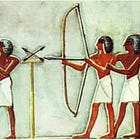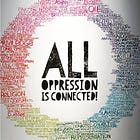Justice Lost: From Plato to Hamas
The road to hell is paved with abstract terminology (and one abstract term in particular)
[Image: Victims of Palestinian “justice”]
My new book Grand Narrative is being released chapter by chapter for paid subscribers. Thank-you in advance for your support.
CONTENTS:
PROLOGUE: The Oxford Union has betrayed British Values
INTRODUCTION: Who’s afraid of grand narrative?
BOOK 1: LANGUAGE: THE MODERN TOWER OF BABEL
1.1: Living a Lie
1.2: Corruption of the Masses
1.3: The Dangerous Confusion of Language
1.4: The Great Genocide Lie
1.5: Hands off Churchill!
1.6: In Praise of the British Empire for Abolishing Slavery Worldwide
1.7: Declaring War on Post-Modernism
1.7.1: Part 1: With “Authentic Feeling”
1.7.2: Part 2: A Genealogy of "Woke" Linguistics
1.8: The Problem with Atheism
1.9: Justice Lost
1.10: Word Inflation
1.11: Word Deflation (Scotland’s Hateful Law on Hate)
1.12: Freedom of speech?
1.13: Thou Shalt Not Lie: On the Destruction of Worlds
1.14: Democracy cannot survive in a world that accepts lies as truth
1.15: The Silent Image
BOOK 2: TRUTH: ON THE BIRTH OF HUMAN AGENCY
BOOK 3: SOVEREIGNTY: ON THE DEMOCRATIC NATION
BOOK 4: NARRATIVE: ON THE FULFILMENT OF MEANING
BOOK 5: FREEDOM: ON WRITING THE NEXT CHAPTER
BOOK 6: COVENANT: ON CREATING A NATION OF NARRATIVE
BOOK 7: NATIONHOOD: ON EXPANDING THE NARRATIVE
BOOK 8: LEADERSHIP: ON REACHING THE PROMISED LAND
BOOK 9: PEACE: THE END OF THE JOURNEY
Chapter 1.10: Justice Lost: From Plato to Hamas
The road to hell is paved with abstract terminology (and one abstract term in particular)
I’m not a great fan of justice. The term that is. For whilst truth implies making claims about reality and peace implies the absence of fighting (no matter the tongue in which they are pronounced), justice is very much in the mouth of the speaker. Too much so in fact.
Even if a Nazi were to speak of peace, we would mutually understand that he was referring to a period without war. Peace would be on his own terms; of that there is no doubt. If the occupied were to accept their fate on a permanent basis and submit to the whims of the brutal master race, then peace - the absence of fighting - would be their reward. Whether spoken in German, English or Arabic, there is a consensus of understanding that would cross borders.
Truth, in much the same vein, has a core sense. Though the boundaries may be blurred, its necessity may be questioned and its contents may be challenged, its friends and foes all accept that if they don’t pay their bills, the electricity will be cut off. It’s a fact. It’s true.
But with justice we are afforded no such luxury; and it is this which makes the idea all the more dangerous. Now to be sure, the civilised all accept the importance of procedural justice: the blessed right to a free trial, that the accused is entitled to a defence, that sentences should be determined according to precedent, that there should be a presumption of innocence; and so on and so forth. We join in celebration at the thought of the rule of law and squirm in horror at the prospect of the innocent behind bars. I could continue to wax lyrical of course, but the idea is well understood: “Justice, justice shall you pursue1”. Although we may continue to debate the role of the State in providing welfare and the place of government in crafting industrial strategy, we all accept that our representatives have three indisputable roles: the defence of the realm, the maintenance of internal peace and the administration of justice. Long may it continue.
But “justice” is rarely limited to discussions of the penal code. Since the days of Plato, justice has been defined far more widely as giving each their due. The Latin motto “suum cuique”2 ("to each their own" or "may all get their due") was made famous by Cicero in De Natura Deorum ("iustitia suum cuique distribuit", justice renders to everyone his due) and was even codified in the Justinian Corpus of Civil Law under the dictum "Justice is a habit whereby a man renders to each one his due with constant and perpetual will". But the idea was first alluded to by Plato in his chef d’oeuvre The Republic (4.333)3 where he stated:
“Will not this be the chief aim of their decisions, that no one shall have what belongs to others or be deprived of his own? Nothing else but this.”
Giving one his due may sound like a statement of high principle - or a restatement of procedural justice in the modern State - but in fact it’s a rogue’s charter to demand that which is in one’s own interest or to proselytize personal ideology. In the self-same passage of The Republic, the Athenian philosopher extends justice to his conception of the State. Having stated uncontroversially that justice was a “universal requirement” when founding the City, he goes onto define the term according to a personal political philosophy:
“And what we did lay down, and often said, you recall, was that each one man must perform one social service in the state for which his nature is best adapted.”4
And then, equally debatably:
“And again that to do one's own business and not to be a busybody is justice, is a saying that we have heard from many and have often repeated ourselves.” …This… if taken in a certain sense appears to be justice, this principle of doing one's own business.”5
Most elastically of all, Plato - through his mouthpiece Socrates - evokes the metaphor that the State is the reflection of the personal soul6. Just as a city is well-ordered with every individual and every class performing their designated role, so an individual must themselves control their desires and habits in a well-regimented manner. A noble idea, no doubt, that reflects the idea in Judaism that the human must control their “yetzer hara” (evil drive)7 as well as the “Invictus” dictum that inspired Nelson Mandela ( “I am the master of my fate, I am the captain of my soul”. Credit: William Ernest Henley8). But is it justice? And even if it were, would the City, as described by Plato, confirm with your idea of justice? When we depart from the basic concept of administrative fairness in criminal, civil and other manners, we enter the world of “individual definition”; or at best “community-specific definition”. Plato may be right or wrong in his views (you decide!), but by stretching abstract definition to its very limits, the Greek opened up the floodgates to 20th Century abuse.
Accepting the Platonic challenge of defining “justice” for themselves, the modern Westerner has been spoilt for choice. We have libertarians who define justice as freedom910, we have social democrats, such as John Rawls11, who define justice as fairness and we have neo-Marxists who define justice in terms of egalitarianism and affirmative action to undo past ills12. Some have defined justice as pertaining to the individual and their opportunities. Yet others have vested justice in the group that have suffered historic wrong. Take your pick. Every current political actor agrees with the Cicero-Plato duo that justice is giving the citizen their due, but none can agree what their due is. Whereas procedural justice is clear, liberating and certainty-provoking, modern à la carte justice sows societal conflict and intra-national division.
The disputes to come were foreseen by Aristotle who first floated the idea of distributive justice (rephrased as “equality by merit”) in the Nicomachean Ethics13. He noted the general principle that most stakeholders can agree upon: “Awards should be 'according to merit'; for all men agree that what is just in distribution must be according to merit in some sense”.
But he then acknowledged the quarrels that inevitably were to come:
“Though they do not all specify the same sort of merit, but democrats identify it with the status of freeman, supporters of oligarchy with wealth (or with noble birth), and supporters of aristocracy with excellence."
Back then, freemen, oligarchs and aristocrats couldn’t agree on distributive justice. Today it’s libertarians, social democrats and the social justice warriors who are at each other’s throats. The contemporaneous debates around university free speech, affirmative action and correct language all emerged from Plato’s fatal error: conflating justice with entirely distinct concepts such as personal self-control, economic distribution and the rights and wrongs of the British expansion of world markets (“Empire”)14 . There are of course political discussions to be had about each of these matters and rightly so: but instead of dispassionately debating the effects of wages and tariffs on the 19th Century British-Indian cotton trade - and talking ourselves to the best conclusions - we are in the gutter, accusing each other of “injustice”. Far from the courtroom, justice has been the 21st Century N word that we throw at each other in contempt.
But while in Britain, America and India, we have traditionally engaged with each other in polite discussion (though this is reducing by the day), in the Arab World, the logic of Plato’s loose tongue is being played out to its logical conclusion. Since the re-establishment of the State of Israel in 1948, there have been ceaseless terrorist attacks against the old-new Jewish State. These culminated in the horrific rape-murder-kidnapping atrocities of October 7th 2023. Yet despite the evident barbarism, that according to the dictates of Western procedural justice would land the perpetrators in prison for life, Palestinian apologists have framed the day’s events as being a “just” response to history. Indeed, a cursory google search of “Palestinians justice” will turn out the following results15:
Middle Eastern Eye: “Finally, achieving true justice means challenging the status quo.”
BDS: “The Palestinian people’s struggle for freedom, justice and equality needs your support.”
Palestine-Justice for all: “Justice For All strongly condemns the ongoing violent assault of Palestinians“.
Morning Star: “A year after October 7, justice for Palestine remains the key to peace in the Middle East”.
The framing of the Palestinian narrative in terms of justice and achieving a “just solution” are a recurring theme with “justice” often involving Jews “going back to Europe”16. At best, it involves “a (Palestinian) right of return” that would denude the Jewish nation of sovereignty, all the while gifting the Palestinians two States (three if you include Jordan17). How leaving the Jews open to genocide by Islamists18 (or at minimum subject to discriminatory laws19) accords to justice is a mystery that only its proponents can answer. And how violent methods for bringing about this “utopia” relate in any way to the dictates of due process is equally troubling: surely Rule 101 of justice is the State replacing the individual as the vessel of vengeance.
[Consider becoming a paid subscriber to read the chapter in full. It includes a bombshell quote from David Hume that you won’t be expecting. There’s always a twist at the end…]
Keep reading with a 7-day free trial
Subscribe to Guerre and Shalom to keep reading this post and get 7 days of free access to the full post archives.







![Living a Lie [Grand Narrative, Chapter 1.1]](https://substackcdn.com/image/fetch/$s_!WsuS!,w_140,h_140,c_fill,f_auto,q_auto:good,fl_progressive:steep,g_auto/https%3A%2F%2Fsubstack-post-media.s3.amazonaws.com%2Fpublic%2Fimages%2Fca972889-18bb-4d7b-a496-c65cc50d7fa6_1035x696.jpeg)


![The Great Genocide Lie [Chapter 1.4]](https://substackcdn.com/image/fetch/$s_!ji7r!,w_140,h_140,c_fill,f_auto,q_auto:good,fl_progressive:steep,g_auto/https%3A%2F%2Fsubstack-post-media.s3.amazonaws.com%2Fpublic%2Fimages%2F04b0ba56-f1e5-4c92-a36a-85294ea84ccb_1014x735.jpeg)
![Hands off Churchill! [Chapter 1.5]](https://substackcdn.com/image/fetch/$s_!6scA!,w_140,h_140,c_fill,f_auto,q_auto:good,fl_progressive:steep,g_auto/https%3A%2F%2Fsubstack-post-media.s3.amazonaws.com%2Fpublic%2Fimages%2F2e1bc915-fb46-419c-8929-1cd34dd68648_841x695.jpeg)

![Declaring War on Postmodernism [Part 1]](https://substackcdn.com/image/fetch/$s_!mjFX!,w_140,h_140,c_fill,f_auto,q_auto:good,fl_progressive:steep,g_auto/https%3A%2F%2Fsubstack-post-media.s3.amazonaws.com%2Fpublic%2Fimages%2F8c9ffcc6-cbef-4ed3-8b71-4ffb2764e360_833x888.jpeg)

![The problem with atheism [Grand Narrative, Chapter 1.8]](https://substackcdn.com/image/fetch/$s_!Y1MH!,w_140,h_140,c_fill,f_auto,q_auto:good,fl_progressive:steep,g_auto/https%3A%2F%2Fsubstack-post-media.s3.amazonaws.com%2Fpublic%2Fimages%2Ff59f5f55-e287-4c2d-8e40-879a149d76dc_992x614.jpeg)